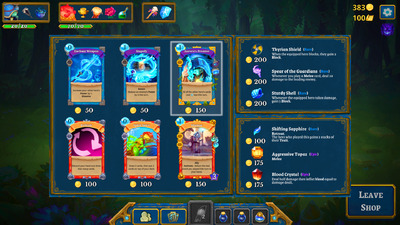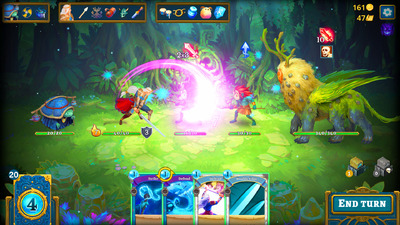The Belgian independent studio Abrakam (Faeria) returns to the front of the stage with the roguelike/deckbuilder Roguebook. As the release date is fast approaching, we had the opportunity to dive into this magical universe.
Update of 23.04.2022: Test of the Switch version, by Alandring
Released on Steam on June 17, 2021, Roguebook has arrived on PlayStation 4, playstation5Xbox One and Xbox Series X|S on February 24, 2022, then on nintendo-switch April 21 of the same year. I had the opportunity to test this version.
The portable console of nintendo was on paper the ideal home ground for the game ofAbraham. Indeed, this one is a deck builder snap-like, that is to say a game based, in theory, on fairly short sessions. Perfect for a portable console, especially since the game is not particularly demanding on a technical level.
The port did not therefore seem too complicated on paper and the contract is fulfilled: the refresh rate is never faulted and the game does not seem less beautiful than on other media. Only downside, loading times a bit long (about ten seconds), but nothing prohibitive.
On the other hand, it is not necessarily the kind of game that I would advise to launch for a few minutes in the bus or the metro… because you risk missing your stop. Indeed, Roguebook differs from other rogue-likes in that its games are actually quite long (several hours). It is possible to stop at any time, the game being divided into several levels themselves separated into multiple encounters, but the game always encourages play just a little more, even if it means going to bed far too late. If it therefore seems more suited to the Switch than other consoles, it’s also the kind of game that is very suitable for people who want to spend hours on their PC, possibly with something else on their second screen.
However, do not worry if you have to interrupt your game along the way: even if you turn off the console or quit the software, you will resume exactly where you left off your adventure, the game having a save system after each encounter . It is very pleasant.
Finally, Roguebook has received many updates since its release on PC and these are, of course, included in this port. On the other hand, the game also received a first paid DLC when it was released on PlayStation as well as on Xbox, which is still sold separately on Switch or integrated into the Deluxe edition of the game. Nothing dramatic, obviously, but this practice is surprising a little, when so many developers and publishers choose to release a version on Nintendo’s portable console that automatically integrates all downloadable content.
All in all, Abrakam did a good job for this port and Roguebook adapts perfectly to Nintendo’s portable console. We would have preferred a little more content for free rather than a paid DLC day onebut that’s not a sufficient reason to sulk its pleasure: if you did not fall for the game when it was released on PC, this port is probably the right opportunity to take the plunge.
A new challenger appears!
It is not uncommon to test independent games throughout the year and even less rare to test Rogue-like currently… More and more studios are trying to get out of the game and pearls appear every year. Moreover, the studio that develops the game we are going to talk about today is not at its first try, because in 2016 they released the excellent Faeria. Today, Abrakam Studio offers us Roguebook, a game mixing mainly two genres: Rogue-like and Deck builder.
At level from the history of the game, we learn that there is a book with all the legends of the world. It was lost in a Faeria well and became the Roguebook. Each page represents a new challenge, a new adventure.
Admittedly, it’s quite minimalist, but the game does not claim to offer a narrative story of weight, simply a magical universe in which you will enjoy evolving as you play.
The game offers you to embody, in each game, 2 of the 4 characters available (2 at the start and 2 unlockable) who each have their fighting style, their cards and their personality. The final objective is to overcome the various bosses until the end of the adventure.
Mechanics as if they were raining…
The first interesting and strategic mechanics of the title are the brush and the inks. Indeed, at each start of the game, the map on which you move is a page almost empty of colors. Impossible then to move except on the path that leads to the boss of the level. It seems excessively dangerous to face the Cerberus directly without having gone around the page, collected money, new cards and improved your characters with objects. For this, you need to paint the boxes with your brush. You start the adventure with several uses of a brush revealing a certain number of squares around you. However, when you have no more uses available, you no longer have a choice: you have to fight the boss.
Several other solutions nevertheless allow you to prolong your adventure: recover inks having various uses, recover a use of brush,… Generally, to obtain this kind of privilege, it will be necessary to make various fights (normal or elites) in the zone. It is therefore necessary to find these to improve its progress in the zone. However, the more you fight, the more dangerous the fights become. It is therefore up to you to think carefully about the risks you will take or not. As in any good Rogue-like, once your characters are dead, it’s back to square one that starts.
Speaking of fights, these are turn-based and use the principle of well-known deck builders like Slay The Spire. However, in Roguebook, these are two characters that you control and Abrakam Studio has thought of everything to enrich the gameplay. Each of your characters evolves in two positions (front and back) and the cards you play use precisely this position system. For example, some cards have an additional effect if the character is in first or second position. Other cards allow you to switch positions with your ally. Finally, defense cards tend to put you on the front line. This position management is really incredibly important to overcome or not your enemies.
At the card level, each character has cards tied to them that can only be used by that character. You collect or buy them throughout your adventures. The goal being that with each defeat, you unlock more and increase the richness of your gameplay while refining the builds available. In addition to their use during battles, you can improve your cards via runes that you collect on the map or after a fight. These runes provide different bonuses like reducing energy cost, copying the map, etc. Note that Richard Garfield, the creator of Magic: The Gathering, worked on the project.
Mayday, Mayday, Goty coming
When you look at the mechanics of the game, you feel all the confidence of the studio. The developers have managed to take elements existing in other games while adapting them to the universe they offer. However, this is not the only aspect of the game that makes it an interesting title. We could indeed talk about the graphic aspect of the game which is quite charming. The characters, the universe… It’s beautiful, colorful, clean. Honestly, the artistic direction will really seduce more than one player so well it is done. Of course, the same goes for the backgrounds of the cards which, without being up to Magic, still offer pleasant illustrations.
Roguebook was a real favorite from the first hours of play. It will take between 15 and 20 hours to get to the end of the game and much more to unlock all the cards, runes, etc. The game is currently priced at 24.99 euros. A price that seems totally affordable to me for this kind of title. It offers solid content currently and will most certainly grow in the coming months/years. As a result, the initial investment will quickly pay for itself in terms of pleasure and time.
The game has been available on Steam(PC, Mac, Linux) since June 17, 2021. It will arrive later on PlayStation 4, PlayStation 5, Xbox One, Xbox Series X|S and Nintendo Switch.
This test was performed on PC by Glaystal via a copy provided by the publisher.
.
The post Roguebook – Roguebook review – Never judge a book by its cover / 04.23 Update: Switch version review appeared first on Gamingsym.


